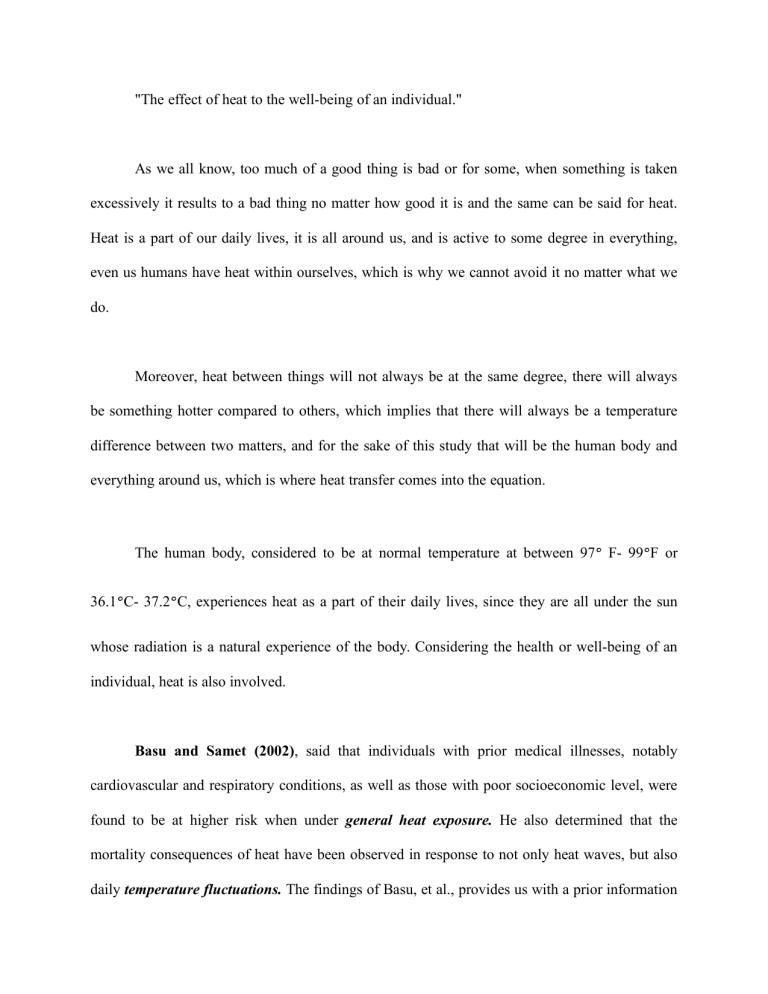
"The effect of heat to the well-being of an individual." As we all know, too much of a good thing is bad or for some, when something is taken excessively it results to a bad thing no matter how good it is and the same can be said for heat. Heat is a part of our daily lives, it is all around us, and is active to some degree in everything, even us humans have heat within ourselves, which is why we cannot avoid it no matter what we do. Moreover, heat between things will not always be at the same degree, there will always be something hotter compared to others, which implies that there will always be a temperature difference between two matters, and for the sake of this study that will be the human body and everything around us, which is where heat transfer comes into the equation. The human body, considered to be at normal temperature at between 97° F- 99°F or 36.1°C- 37.2°C, experiences heat as a part of their daily lives, since they are all under the sun whose radiation is a natural experience of the body. Considering the health or well-being of an individual, heat is also involved. Basu and Samet (2002), said that individuals with prior medical illnesses, notably cardiovascular and respiratory conditions, as well as those with poor socioeconomic level, were found to be at higher risk when under general heat exposure. He also determined that the mortality consequences of heat have been observed in response to not only heat waves, but also daily temperature fluctuations. The findings of Basu, et al., provides us with a prior information that not only heat itself affect humans, particularly in their well-being, which is shown in their statement that says the mortality consequences in response to heat waves and temperature fluctuation. Temperature fluctuation means that there is either a rise or a fall in the temperature, which is related to temperature difference and temperature difference is the main reason why heat transfer occurs. Simply put, Basu et al.’s statement tells us that there is a correlation between heat transfer, heat and the well-being of an individual, taking their findings into consideration. Moreover, heat does not affect us by just a simple exposure. The well being of an individual is also affected by time of exposure wherein the National Institute of Environmental Health Sciences (2017), says that prolonged exposure to extreme heat can cause heat exhaustion, heat cramps, heat stroke, and death, as well as exacerbate preexisting chronic conditions, such as various respiratory, cerebral, and cardiovascular diseases. As global temperatures rise and extreme heat events increase in frequency due to climate change, we can expect to see more heat-related illnesses and mortality. The aforementioned statement implies that not only heat itself affects the well-being of an individual but also the rate at which the individual is exposed to the heat or the rate at which the individual experiences heat. This rate also implies that heat transfer is a factor in the well-being of an individual. Furthermore, an individual’s well-being is also seen through their emotional state and Noelke C, et al. (2016), conducted studies in U.S. population aged 18 and above to show the significant impact of ambient temperature to the people’s emotional well-being. The study being said found out that the temperatures above 70 °F (21 °C) positive emotions such as joy, happiness decreases and along to the increasing ambient temperature, negative emotions such as stress, anger, fatigue, and having a low energy increase. Moreover, according to Pogačar T., et al. , heat stress affects the productivity, well-being of the workers who worked in the manufacturing industries that have a high temperature surrounding. The researchers being said conducted a study and survey in Automobile Parts Manufacturing Plant in Slovenia and out of 400 workers, 384 of them or 96% of the respondents stated that the temperature in their workplace make them feel uncomfortable and is not able to work properly. Hence, we can say that heat can affect an individual not only physically but also emotionally. On the other hand, some considers heat as a medicine for the body. Sowmya Binu, MSc., M.phil Food And Nutrition (2020), said that the ancient medicine strongly suggests drinking warm water especially in the mornings as it heals body from within, boosts metabolism, fuels digestive power. Studies reveal that warm water tightens intestines and reduces metabolic waste. Here is why you should be drinking warm water for health benefits: Flushes Out Toxins Relieves Constipation Pain Relief Lose Weight Stops Premature Aging Considering that there are some benefits that we are able to get, we might be able to consider heat to be healthy for the body. Peggy Pletcher, M.S., R.D., L.D., CDE (2016), said that for hundreds of years, Scandinavians have been using saunas for their alleged benefits of cleansing, relaxation, and weight loss. In Finland, for example, there are roughly 2 million saunas for the country’s 5.2 million people. Sauna use in Scandinavian countries starts in early childhood. Current research about the benefits of saunas is mixed. If you’re considering adding the sauna to your health and wellness routine, make sure to evaluate your specific health needs first. When you enter a sauna, your skin temperature rises, your pulse rate soars, and your blood vessels become more dilated. This happens as your heart begins to pump more blood. Of course, you also begin to sweat. There are a few benefits to this experience. Relaxation Pain relief Intake or exposure to heat can be soothing or relaxing for some but considering the statement of the previous author that we must evaluate our specific health needs first implies that it is not at all necessary to do so, if beneficial do so and if not then do not. On a side note, we humans consider morning sun heat is healthy for the skin and sun heat during noon is not. On a final note, we are able to say that heat and heat transfer is a factor that affects an individual, not only physically but emotionally and not only on a negative side but also on a positive side. Through the aforementioned findings and statements, we are able to conclude that heat and heat transfer affects the well-being of an individual under different circumstances, such as but not limited to temperature differences or temperature fluctuations at different times, prolonged exposure to heat, and intake of substances. We are able to say that heat affects an individual either positively or negatively because of different circumstances as some uses heat as a treatment and some experiences it naturally by means of work affecting their daily lives. However the circumstance, the thing to be taken into consideration is that heat is natural phenomenon experienced by an individual and that heat must be taken lightly (literally) as prolonged exposure, exposure to high heat and exposure to different temperatures prove to be unhealthy for an individual and intake of a warm substance prove to be healthy for the body. As for the benefits of sauna, not all can experience the benefit, considering that usually people at areas with lower temperature uses sauna to regulate the body temperature and that they only last for minutes. All in all, Heat and Heat Transfer affects an individual’s well-being considering the processes involved in heat transfer such as temperature differences and the rate at which heat is transferred. References: Noelke, C., McGovern, M., Corsi, D. J., Jimenez, M. P., Stern, A., Wing, I. S., & Berkman, L. (2016). Increasing ambient temperature reduces emotional well-being. Environmental research, 151, 124-129.: https://www.sciencedirect.com/science/article/abs/pii Basu R, Samet JM. Relation between elevated ambient temperature and mortality: a review of the epidemiologic evidence. Epidemiologic reviews. 2002;24(2):190–202. [PubMed] [Google Scholar]: https://www.ncbi.nlm.nih.gov/pmc/articles/PMC2759912/ National Institute of Environmental Health Sciences, 13Effects of Heat, Climate and Human Health: https://www.niehs.nih.gov/research/programs/climatechange/health_impacts/heat/index.cfm Sowmya Binu,5 Ways In Which Drinking Warm Water Helps: https://www.netmeds.com/healthlibrary/post/5-ways-in-which-drinking-warm-water-benefits-the-body Peggy Pletcher, M.S., R.D., L.D., CDE, Are Saunas Good for You?: https://www.healthline.com/health/fitness-exercise/are-saunas-good-for-you



